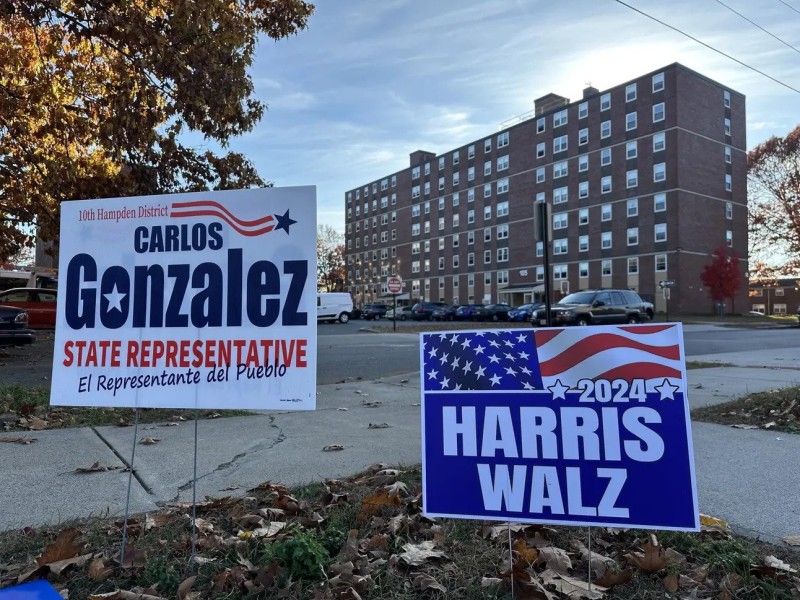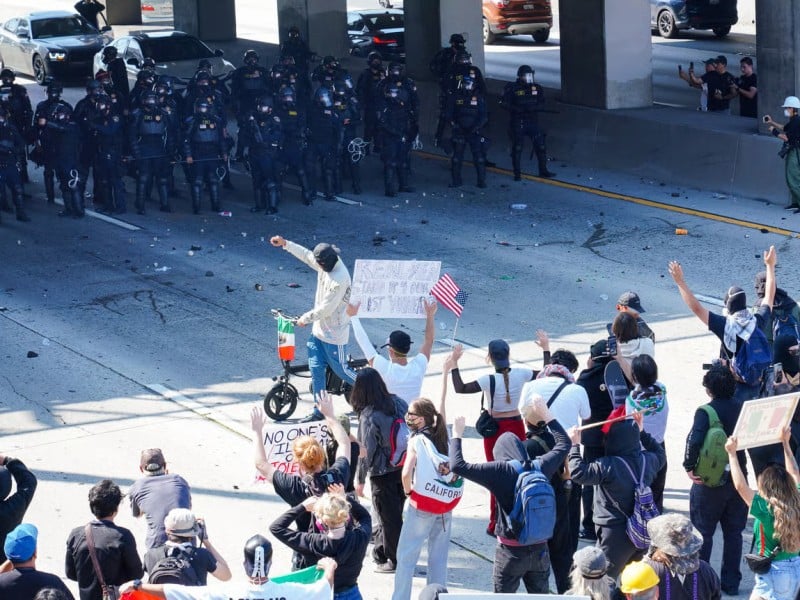Latino Voices React to 2024 Results
National exit polls revealed that Donald Trump achieved historic support among Latino voters, securing 45% of their votes—a level not reached by a Republican candidate since George W. Bush in 2004.

Originally published in The Latino Newsletter–reprinted with permission.
As the 2024 election season unfolds, the Latino Election Project from The Latino Newsletter and New England Public Media features the work of student producers Ian Burger, Halima Mohamed, and Evanni Santos with support from Donyel Le’Noir Felton. The team is reporting on election cycle stories through the lens of the Latino community in western Massachusetts.
This is part five of a five-part series. The entire series is here.
SPRINGFIELD, MA — National exit polls revealed that Donald Trump achieved historic support among Latino voters, securing 45% of their votes—a level not reached by a Republican candidate since George W. Bush in 2004. In western Massachusetts cities like Holyoke and Springfield, where Latinos make up nearly half the population, preliminary results showed a noticeable shift toward Republican candidates.
To understand these voting trends, local Latina and Latino leaders shared their perspectives.
Xiomara DeLobato, vice president and chief of staff at the Economic Development Council of Western Massachusetts, wasn’t surprised by Trump’s support among Latino men, attributing it in part to cultural factors.
“That ingrained cultural machismo that we see a lot in the Latino community—it’s not a secret,” she said. “That misogyny that is very ingrained in our culture as a whole, right? All of Latin America, all of our countries in our heritage, it is, we’re talking like centuries old.”
Holyoke Mayor Joshua Garcia saw Trump’s appeal as partly rooted in shared conservative values among many Latinos, alongside broader frustrations felt nationwide.
“The conservative ideas and values that most Latino cultures uphold on important issues that we all debate about across the country. And I think there’s just a combination of factors that weighed in to why we saw what we saw,” he said.
Garcia also emphasized that national election outcomes shouldn’t overshadow local unity.
“It’s frustrating because we all work so hard to foster unity, to foster collaboration, around our city,” he said. “And I just urge everybody not to let these results and other noise distract us from who we are as people, as human beings and what we have built together here.”
Springfield City Councilor Jose Delgado, who has observed a shift toward conservatism among Latinos, was similarly unsurprised by the election results.
“We all have different kinds of ideologies. And that’s something that I’ve noticed for a while,” Delgado said. “And I think that really played out in this election. You take Massachusetts aside, right? We’re kind of in our own little bubble. It’s obviously a blue state, but when I started reading some of the stuff that I was hearing from Latinos who are voting in Southern states, the stats showed that more and more are starting to lean right. Or more conservative.”
DeLobato also highlighted the economy as a major influence on voter behavior.
“We feel the impact to our purse,” she said, noting that many associated these economic concerns with the Biden-Harris administration, “when it’s a tax plan and economic plan that was inherited from the former administration.”
The team also spoke with voters in Springfield’s predominantly Latino North End, where economic issues were top of mind. While some voiced concerns about the economy, that didn’t necessarily translate into Republican support.
Ana Fontanez, who voted for Harris, said in Spanish that “Kamala is a Democrat, and Democrats have always supported the poor and the humble.”
“They support us because we’re in a country where we want to move forward and look to the future,” she added.
Jose Matias, another Springfield voter, explained his support for Harris over Trump, citing Trump’s treatment of Puerto Rico.
“The only ones that are going for Trump are unfortunately the Latinos that think they’re going to get money from him, which is not going to happen,” he said. “But after the comedian that roasted Puerto Rico, we definitely jumped on and said, you know what, screw him. And we’re definitely going to go with Harris.”
One thing is certain: the 2024 election highlights the diversity within the Latino electorate. Latinos are not a monolith. They are increasingly independent and prepared to hold both parties accountable.
Voces latinas reflexionan sobre los resultados de 2024
Las encuestas de salida nacionales revelan un apoyo histórico a Donald Trump entre votantes latinos, alcanzando el 45% de sus votos, un nivel que un candidato republicano no obtenía desde George W. Bush en 2004. En ciudades del oeste de Massachusetts como Holyoke y Springfield, donde los latinos representan casi la mitad de la población, los resultados preliminares muestran un cambio notable hacia los candidatos republicanos.
Para entender estas tendencias de votación, líderes latinos y latinas locales comparten sus perspectivas.
Xiomara DeLobato, vicepresidenta y jefa de gabinete del Consejo de Desarrollo Económico del Oeste de Massachusetts, no está sorprendida por el apoyo de los hombres latinos a Trump, atribuyéndolo en parte a factores culturales.
“Ese machismo cultural que vemos mucho en la comunidad latina, no es un secreto”, comenta. “Esa misoginia está muy integrada en nuestra cultura en general. Toda América Latina, todos nuestros países y nuestra herencia, estamos hablando de algo que tiene siglos de antigüedad”.
El alcalde de Holyoke, Joshua García, percibe el apoyo a Trump como reflejo de los valores conservadores que muchos latinos comparten, junto con frustraciones a nivel nacional.
“Las ideas y valores conservadores, que la mayoría de las culturas latinas sostienen en temas importantes que todos debatimos en el país. Y creo que es una combinación de factores que influyeron en lo que vimos”, dice García.
García también enfatiza que los resultados nacionales no deberían opacar la unidad local.
“Es frustrante porque todos trabajamos muy duro para fomentar la unidad y la colaboración en nuestra ciudad”, explica. “Les pido a todos que no dejemos que estos resultados nos distraigan de lo que somos como personas, como seres humanos y de lo que hemos construido juntos aquí”.
El concejal de Springfield, José Delgado, quien ve a más latinos inclinarse hacia ideas conservadoras, no se sorprende por los resultados de las elecciones.
“Todos tenemos diferentes tipos de ideologías. Y eso es algo que he notado desde hace tiempo”, comenta Delgado. “Creo que realmente se reflejó en esta elección. Dejando a un lado a Massachusetts, estamos en nuestra propia burbuja. Es obvio que es un estado azul, pero cuando comencé a leer y escuchar de los latinos que están votando en los estados del sur, las estadísticas mostraban que cada vez más empiezan a inclinarse hacia la derecha o más conservadores.”
De Lobato también destaca la economía como una influencia importante en las elecciones.
“Sentimos el impacto en nuestros bolsillos,” dice, señalando que muchos asociaban estas preocupaciones económicas con la administración de Biden-Harris, “aunque es un plan tributario y económico que fue heredado de la administración anterior.”
El equipo también habla con votantes en el vecindario predominantemente latino de North End en Springfield, donde las preocupaciones económicas ocupan un lugar destacado. Aunque algunos expresaron inquietudes sobre la economía, esto no necesariamente se traduce en apoyo a los republicanos.
Ana Fontanez, quien votó por Harris, dice: “Kamala es demócrata y siempre los demócratas están a favor de los pobres y de los más humildes”.
“Nos apoyan, porque estamos en un país donde queremos seguir adelante y mirar hacia el futuro”, añade.
Otro votante de Springfield, José Matías, explica su apoyo a Harris sobre Trump, citando el trato de Trump a Puerto Rico.
“Los únicos que están con Trump son, desafortunadamente, los latinos que piensan que van a obtener dinero de él, lo cual no va a suceder”, comenta. “Pero después de la forma en que trató a Puerto Rico, definitivamente dijimos, ya sabes qué, no gracias. Y definitivamente vamos a apoyar a Harris”.
Lo que queda claro es que la elección de 2024 confirma la diversidad dentro del electorado latino. Los latinos no son un sector homogéneo. Son cada vez más independientes y están listos para exigir responsabilidad a ambos partidos.
Ésta es la quinta y última entrega de una serie de cinco partes El Proyecto Electoral Latino.




